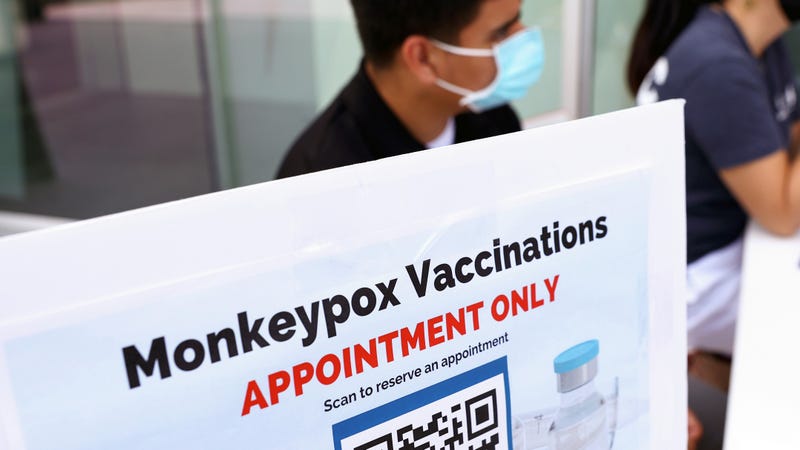
PHILADELPHIA (KYW Newsradio, AP) — Federal health officials are declaring monkeypox a health emergency, as total cases across the country climbed by about 1,000 over the past week to a total of 6,600 cases nationwide.
Health and Human Services Secretary Xavier Becerra announced the emergency declaration on a conference call with reporters.
“We're prepared to take our response to the next level in addressing this virus, and we urge every American to take monkeypox seriously and to take responsibility to help us tackle this virus,” he said.
Health officials say the declaration can free up funding and lessen red tape for an improved response to the spread of the virus.
“This public health emergency will allow us to explore additional strategies to get vaccines and treatments work quickly out to the impacted communities,” said White House monkeypox response coordinator Robert Fenton.
“It will allow us to get more data from jurisdictions so we can effectively track and attack this outbreak.”
Health officials say that as they work to expand vaccine supply, they’re relying on testing and education, especially among high-risk populations with the vast majority of cases among gay and bisexual men. But health officials emphasize that the virus can infect anyone.
“We have plans to provide technical assistance to state and local health departments to develop and ramp up non-stigmatizing messaging, as they prepare for any large gatherings in the coming weeks and months,” said Deputy White House response coordinator Dr. Demetre Daskalakis.
Education also applies to healthcare providers to recognize signs of the virus to recommend testing.
The declaration by HHS comes as the Biden administration has faced criticism over monkeypox vaccine availability.
Clinics in major cities including Philadelphia say they haven’t received enough of the two-shot vaccine to meet demand, and some have had to stop offering the second dose to ensure supply of first doses.
The White House said it has made more than 1.1 million doses available and has helped to boost domestic diagnostic capacity to 80,000 tests per week.
The monkeypox virus spreads through prolonged skin-to-skin contact, including hugging, cuddling and kissing, as well as sharing bedding, towels and clothing.
FDA Commissioner Dr. Robert Califf says at the rate the virus is spreading, the U.S. is at what he calls “a critical inflection point.”
He says the FDA is considering what’s called “dose-sparing,” a different way of injecting the vaccine:
“That would allow health care providers to use an existing one-dose vial of the vaccine to administer a total of up to five separate doses.”
No one in the United States has died. A few deaths have been reported in other countries.
Earlier this week, the Biden administration named top officials from the Federal Emergency Management Agency and the Centers for Disease Control and Prevention to serve as the White House coordinators to combat monkeypox.
Thursday's declaration is an important — and overdue — step, said Lawrence Gostin, a public health law expert at Georgetown University.
“It signals the U.S. government’s seriousness and purpose, and sounds a global alarm,” he said.
Under the declaration, HHS can draw from emergency funds, hire or reassign staff to deal with the outbreak and take other steps to control the virus.
For example, the announcement should help the federal government to seek more information from state and local health officials about who is becoming infected and who is being vaccinated. That information can be used to better understand how the outbreak is unfolding and how well the vaccine works.
Gostin said the U.S. government has been too cautious and should have declared a nationwide emergency earlier. Public health measures to control outbreaks have increasingly faced legal challenges in recent years, but Gostin didn’t expect that to happen with monkeypox.
“It is a textbook case of a public health emergency,” Gostin said. “It’s not a red or a blue state issue. There is no political opposition to fighting monkeypox.”
A public health emergency can be extended, similar to what happened during the COVID-19 pandemic, he noted.
Last week, the World Health Organization called monkeypox a public health emergency, with cases in more than 70 countries. A global emergency is WHO’s highest level of alert, but the designation does not necessarily mean a disease is particularly transmissible or lethal.
The declaration of a national public health emergency and the naming of a monkeypox czar are “symbolic actions,” said Gregg Gonsalves, a Yale University infectious diseases expert.
What’s important is that the government is taking the necessary steps to control the outbreak and — if it comes to that — to have a plan for how to deal with monkeypox if it becomes endemic, he said.
Monkeypox is endemic in parts of Africa, where people have been infected through bites from rodents or small animals. It does not usually spread easily among people.
But in May, a wave of unexpected cases began emerging in Europe and the United States. Now nearly 26,000 cases have been reported in countries that traditionally have not seen monkeypox.
Related podcast







